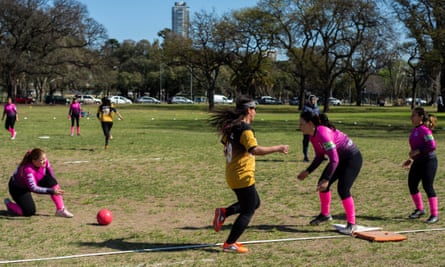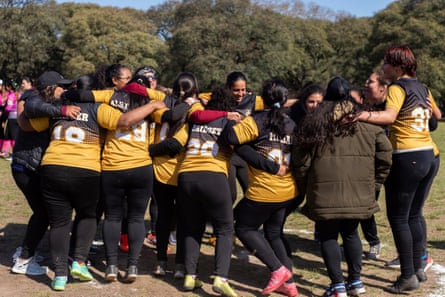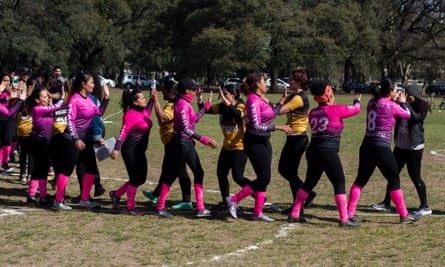ANDvery Sunday, about 100 or so women from teens to middle age meet in Parque Olimpico in Buenos Aires. Using flour, they mark out a court on the grass, to play a sport that brings them a little bit of home in their adopted country.
Kickingball, a blend of football and baseball, is common across Venezuela and the refugees who left the country during the political and economic implosion of Nicolás Maduro’s government are bringing it to Argentina.
“This is like having a little piece of what’s yours here,” says María Gabriela Pratto, 29, one of the crowd watching Jacarandá take on Académicas. The financial analyst left Venezuela in 2020 because there was no work.
She was 10 when she started playing kickball, a variation of the US sport kickball, brought to Venezuela in 1965 by teacher Charito Ramírez. Two teams of 10 play on a baseball pitch, kicking footballs to score runs. If a ball is caught, the kicker is out.
By the 1980s, it was popularity was such that it had its own federation and national tournaments. There are teams in every school and university in Venezuela.
The idea to start a league in Argentina began over coffee in March 2019. Diana Martínez, Anyelin Calderón, Rona Montesino and Maygle Hernández wanted to “reconnect with their roots”.

They advertised on social media, expecting a handful of women to turn up but attracted a crowd. “After that, we had the idea to do something a little more ambitious,” says Hernández. There are now nine teams and the Sunday matches in the park draw spirited crowds and stalls have sprung up selling Venezuelan food and drink such as chicha (a rice drink), arepas (corn cakes) and empanadas.
“A lot of families who spend Sundays in this park now know what kickingball is and they like it. They know what chicha is and they drink it … They make our culture their own,” says Pratto, who plays for the Warriors.
“This is like a new family for us,” says Montesino, particularly for the women who don’t have relatives or friends in Argentina.
Some of those who play are from the LGBTQ+ community, who faced discrimination at home where same-sex marriage remains illegal and laws banning discrimination in the workplace are rarely enforced.

“[In Venezuela] we have a very sexist and closed society regarding the LGBTQ+ community. You’re discriminated against or mocked if you’re gay or bisexual. But here, we’re free,” says Dilimar Ramos, 30, a kinesiologist who plays for the Warriors.
“It’s not that you have to be gay to play kickingball,” she says. “But with these girls, you feel free to be who you are. You don’t have to hide or to be afraid of what people will say.”

Later this month, the best players will be selected to play in a tournament in Colombia organized by the International Federation of Kickingball, established in 2020 with 16 member countries.
The squad, currently raising money for the trip, will play in the blue and white colors of Argentina. “Even though it is a Venezuelan sport and we’re Venezuelan, I’m very proud to represent Argentina,” says Pratto.
Grecia Esparragoza, 26, agrees. As the final whistle blows on the match, giving her team, Jacarandá, victory, she says: “I am very thankful to this country, it taught me to never give up on my dreams, and gave me freedom.”
www.theguardian.com
George is Digismak’s reported cum editor with 13 years of experience in Journalism